Travel & Tourism: Historical Development, Demand & Economic Impact
VerifiedAdded on 2020/10/05
|12
|4043
|285
Report
AI Summary
This report provides a comprehensive analysis of the travel and tourism sector, starting with its historical development and the evolving expectations of travelers. It examines the structure of the industry, highlighting key components such as transportation, accommodation, attractions, and the role of travel agents and tour operators. The report further explores the functions of government bodies and international agencies in managing and promoting tourism, as well as the influence of local and national economic policies on the sector's success, including the implications of political changes, particularly in the context of China. Factors affecting tourism demand are discussed, along with changes in supply strategies at TUI Group. Finally, the report evaluates the positive and negative economic, environmental, and social impacts of tourism, proposing strategies to mitigate the negative effects and maximize the positive contributions of the industry, with a focus on TUI Group's operations.
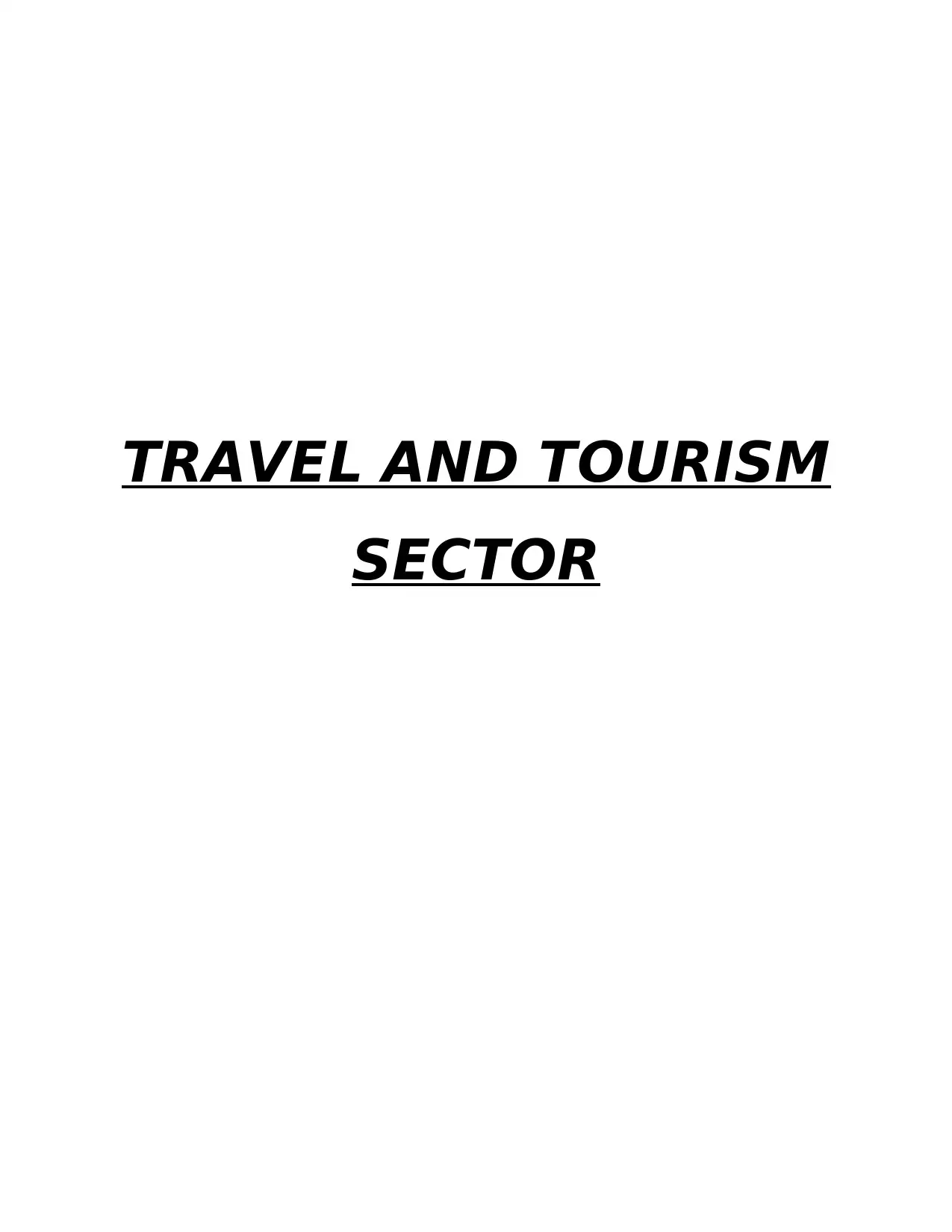
TRAVEL AND TOURISM
SECTOR
SECTOR
Paraphrase This Document
Need a fresh take? Get an instant paraphrase of this document with our AI Paraphraser
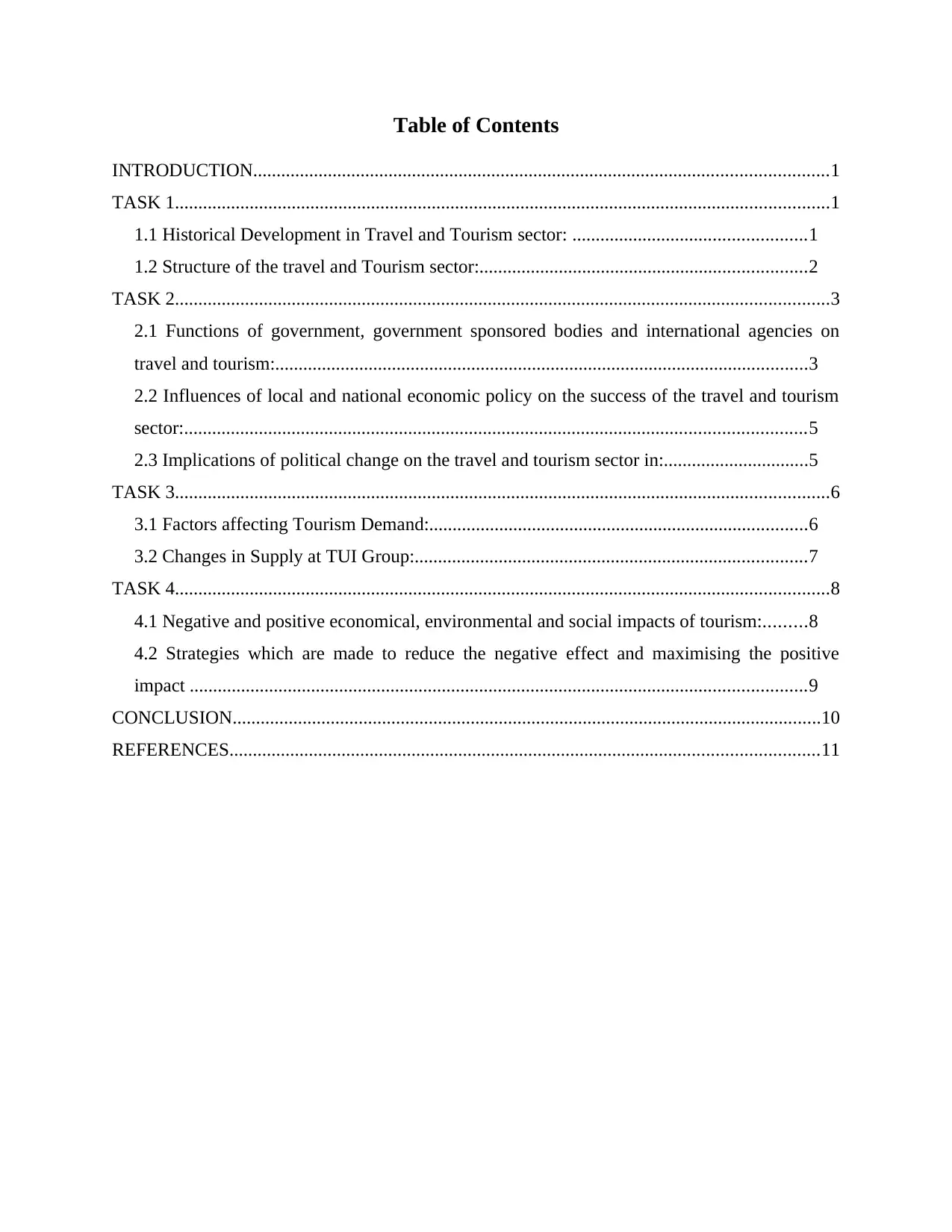
Table of Contents
INTRODUCTION...........................................................................................................................1
TASK 1............................................................................................................................................1
1.1 Historical Development in Travel and Tourism sector: ..................................................1
1.2 Structure of the travel and Tourism sector:......................................................................2
TASK 2............................................................................................................................................3
2.1 Functions of government, government sponsored bodies and international agencies on
travel and tourism:..................................................................................................................3
2.2 Influences of local and national economic policy on the success of the travel and tourism
sector:.....................................................................................................................................5
2.3 Implications of political change on the travel and tourism sector in:...............................5
TASK 3............................................................................................................................................6
3.1 Factors affecting Tourism Demand:.................................................................................6
3.2 Changes in Supply at TUI Group:....................................................................................7
TASK 4............................................................................................................................................8
4.1 Negative and positive economical, environmental and social impacts of tourism:.........8
4.2 Strategies which are made to reduce the negative effect and maximising the positive
impact ....................................................................................................................................9
CONCLUSION..............................................................................................................................10
REFERENCES..............................................................................................................................11
INTRODUCTION...........................................................................................................................1
TASK 1............................................................................................................................................1
1.1 Historical Development in Travel and Tourism sector: ..................................................1
1.2 Structure of the travel and Tourism sector:......................................................................2
TASK 2............................................................................................................................................3
2.1 Functions of government, government sponsored bodies and international agencies on
travel and tourism:..................................................................................................................3
2.2 Influences of local and national economic policy on the success of the travel and tourism
sector:.....................................................................................................................................5
2.3 Implications of political change on the travel and tourism sector in:...............................5
TASK 3............................................................................................................................................6
3.1 Factors affecting Tourism Demand:.................................................................................6
3.2 Changes in Supply at TUI Group:....................................................................................7
TASK 4............................................................................................................................................8
4.1 Negative and positive economical, environmental and social impacts of tourism:.........8
4.2 Strategies which are made to reduce the negative effect and maximising the positive
impact ....................................................................................................................................9
CONCLUSION..............................................................................................................................10
REFERENCES..............................................................................................................................11
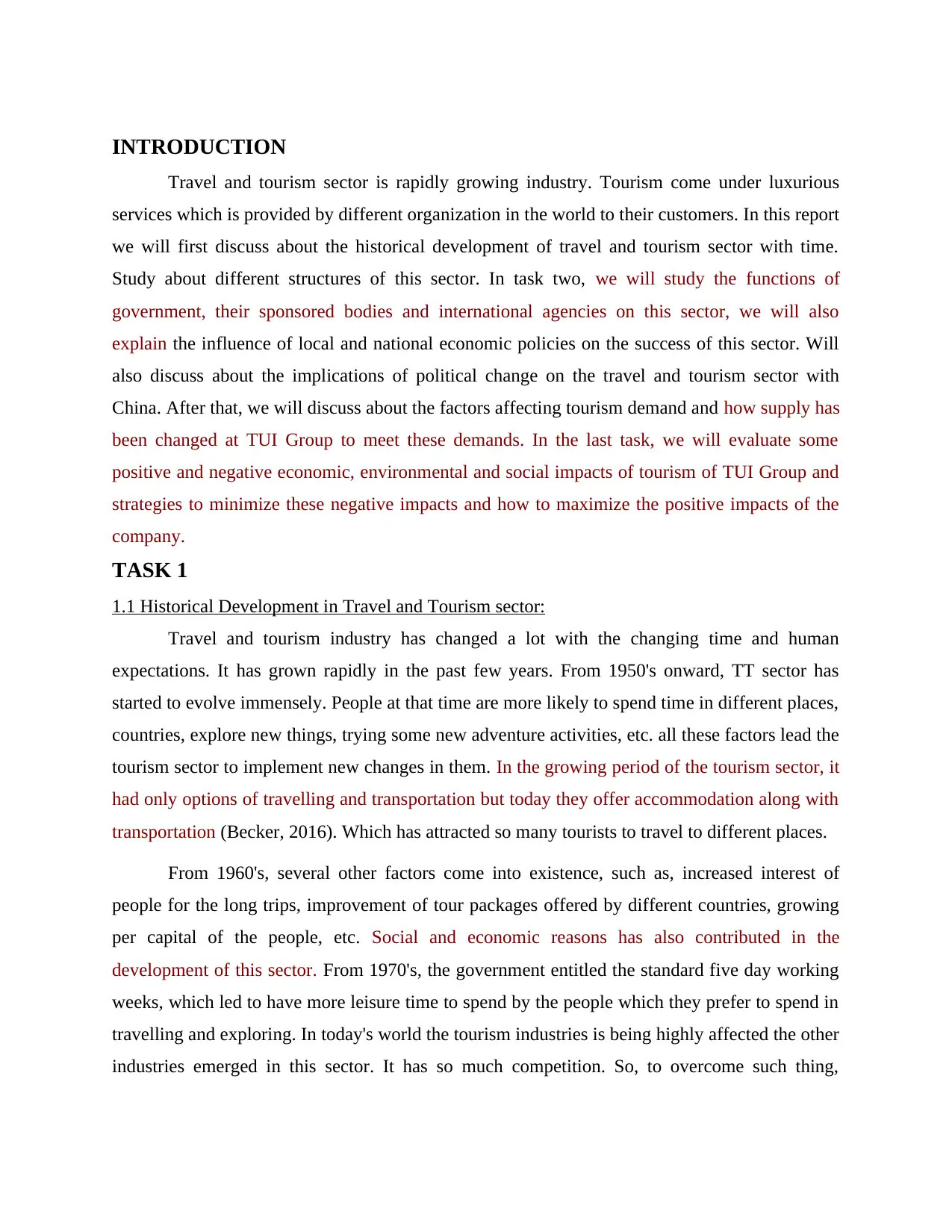
INTRODUCTION
Travel and tourism sector is rapidly growing industry. Tourism come under luxurious
services which is provided by different organization in the world to their customers. In this report
we will first discuss about the historical development of travel and tourism sector with time.
Study about different structures of this sector. In task two, we will study the functions of
government, their sponsored bodies and international agencies on this sector, we will also
explain the influence of local and national economic policies on the success of this sector. Will
also discuss about the implications of political change on the travel and tourism sector with
China. After that, we will discuss about the factors affecting tourism demand and how supply has
been changed at TUI Group to meet these demands. In the last task, we will evaluate some
positive and negative economic, environmental and social impacts of tourism of TUI Group and
strategies to minimize these negative impacts and how to maximize the positive impacts of the
company.
TASK 1
1.1 Historical Development in Travel and Tourism sector:
Travel and tourism industry has changed a lot with the changing time and human
expectations. It has grown rapidly in the past few years. From 1950's onward, TT sector has
started to evolve immensely. People at that time are more likely to spend time in different places,
countries, explore new things, trying some new adventure activities, etc. all these factors lead the
tourism sector to implement new changes in them. In the growing period of the tourism sector, it
had only options of travelling and transportation but today they offer accommodation along with
transportation (Becker, 2016). Which has attracted so many tourists to travel to different places.
From 1960's, several other factors come into existence, such as, increased interest of
people for the long trips, improvement of tour packages offered by different countries, growing
per capital of the people, etc. Social and economic reasons has also contributed in the
development of this sector. From 1970's, the government entitled the standard five day working
weeks, which led to have more leisure time to spend by the people which they prefer to spend in
travelling and exploring. In today's world the tourism industries is being highly affected the other
industries emerged in this sector. It has so much competition. So, to overcome such thing,
Travel and tourism sector is rapidly growing industry. Tourism come under luxurious
services which is provided by different organization in the world to their customers. In this report
we will first discuss about the historical development of travel and tourism sector with time.
Study about different structures of this sector. In task two, we will study the functions of
government, their sponsored bodies and international agencies on this sector, we will also
explain the influence of local and national economic policies on the success of this sector. Will
also discuss about the implications of political change on the travel and tourism sector with
China. After that, we will discuss about the factors affecting tourism demand and how supply has
been changed at TUI Group to meet these demands. In the last task, we will evaluate some
positive and negative economic, environmental and social impacts of tourism of TUI Group and
strategies to minimize these negative impacts and how to maximize the positive impacts of the
company.
TASK 1
1.1 Historical Development in Travel and Tourism sector:
Travel and tourism industry has changed a lot with the changing time and human
expectations. It has grown rapidly in the past few years. From 1950's onward, TT sector has
started to evolve immensely. People at that time are more likely to spend time in different places,
countries, explore new things, trying some new adventure activities, etc. all these factors lead the
tourism sector to implement new changes in them. In the growing period of the tourism sector, it
had only options of travelling and transportation but today they offer accommodation along with
transportation (Becker, 2016). Which has attracted so many tourists to travel to different places.
From 1960's, several other factors come into existence, such as, increased interest of
people for the long trips, improvement of tour packages offered by different countries, growing
per capital of the people, etc. Social and economic reasons has also contributed in the
development of this sector. From 1970's, the government entitled the standard five day working
weeks, which led to have more leisure time to spend by the people which they prefer to spend in
travelling and exploring. In today's world the tourism industries is being highly affected the other
industries emerged in this sector. It has so much competition. So, to overcome such thing,
⊘ This is a preview!⊘
Do you want full access?
Subscribe today to unlock all pages.

Trusted by 1+ million students worldwide
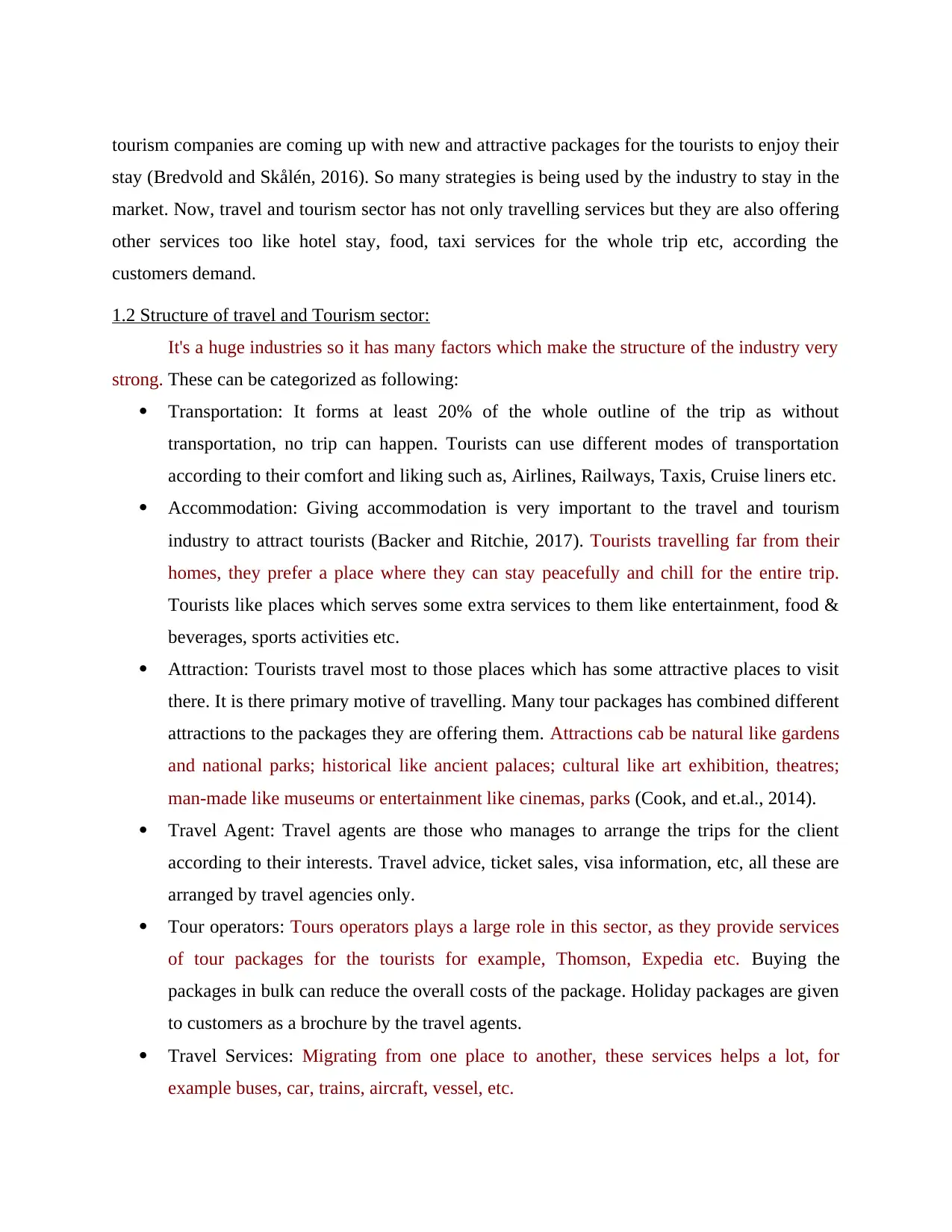
tourism companies are coming up with new and attractive packages for the tourists to enjoy their
stay (Bredvold and Skålén, 2016). So many strategies is being used by the industry to stay in the
market. Now, travel and tourism sector has not only travelling services but they are also offering
other services too like hotel stay, food, taxi services for the whole trip etc, according the
customers demand.
1.2 Structure of travel and Tourism sector:
It's a huge industries so it has many factors which make the structure of the industry very
strong. These can be categorized as following:
Transportation: It forms at least 20% of the whole outline of the trip as without
transportation, no trip can happen. Tourists can use different modes of transportation
according to their comfort and liking such as, Airlines, Railways, Taxis, Cruise liners etc.
Accommodation: Giving accommodation is very important to the travel and tourism
industry to attract tourists (Backer and Ritchie, 2017). Tourists travelling far from their
homes, they prefer a place where they can stay peacefully and chill for the entire trip.
Tourists like places which serves some extra services to them like entertainment, food &
beverages, sports activities etc.
Attraction: Tourists travel most to those places which has some attractive places to visit
there. It is there primary motive of travelling. Many tour packages has combined different
attractions to the packages they are offering them. Attractions cab be natural like gardens
and national parks; historical like ancient palaces; cultural like art exhibition, theatres;
man-made like museums or entertainment like cinemas, parks (Cook, and et.al., 2014).
Travel Agent: Travel agents are those who manages to arrange the trips for the client
according to their interests. Travel advice, ticket sales, visa information, etc, all these are
arranged by travel agencies only.
Tour operators: Tours operators plays a large role in this sector, as they provide services
of tour packages for the tourists for example, Thomson, Expedia etc. Buying the
packages in bulk can reduce the overall costs of the package. Holiday packages are given
to customers as a brochure by the travel agents.
Travel Services: Migrating from one place to another, these services helps a lot, for
example buses, car, trains, aircraft, vessel, etc.
stay (Bredvold and Skålén, 2016). So many strategies is being used by the industry to stay in the
market. Now, travel and tourism sector has not only travelling services but they are also offering
other services too like hotel stay, food, taxi services for the whole trip etc, according the
customers demand.
1.2 Structure of travel and Tourism sector:
It's a huge industries so it has many factors which make the structure of the industry very
strong. These can be categorized as following:
Transportation: It forms at least 20% of the whole outline of the trip as without
transportation, no trip can happen. Tourists can use different modes of transportation
according to their comfort and liking such as, Airlines, Railways, Taxis, Cruise liners etc.
Accommodation: Giving accommodation is very important to the travel and tourism
industry to attract tourists (Backer and Ritchie, 2017). Tourists travelling far from their
homes, they prefer a place where they can stay peacefully and chill for the entire trip.
Tourists like places which serves some extra services to them like entertainment, food &
beverages, sports activities etc.
Attraction: Tourists travel most to those places which has some attractive places to visit
there. It is there primary motive of travelling. Many tour packages has combined different
attractions to the packages they are offering them. Attractions cab be natural like gardens
and national parks; historical like ancient palaces; cultural like art exhibition, theatres;
man-made like museums or entertainment like cinemas, parks (Cook, and et.al., 2014).
Travel Agent: Travel agents are those who manages to arrange the trips for the client
according to their interests. Travel advice, ticket sales, visa information, etc, all these are
arranged by travel agencies only.
Tour operators: Tours operators plays a large role in this sector, as they provide services
of tour packages for the tourists for example, Thomson, Expedia etc. Buying the
packages in bulk can reduce the overall costs of the package. Holiday packages are given
to customers as a brochure by the travel agents.
Travel Services: Migrating from one place to another, these services helps a lot, for
example buses, car, trains, aircraft, vessel, etc.
Paraphrase This Document
Need a fresh take? Get an instant paraphrase of this document with our AI Paraphraser
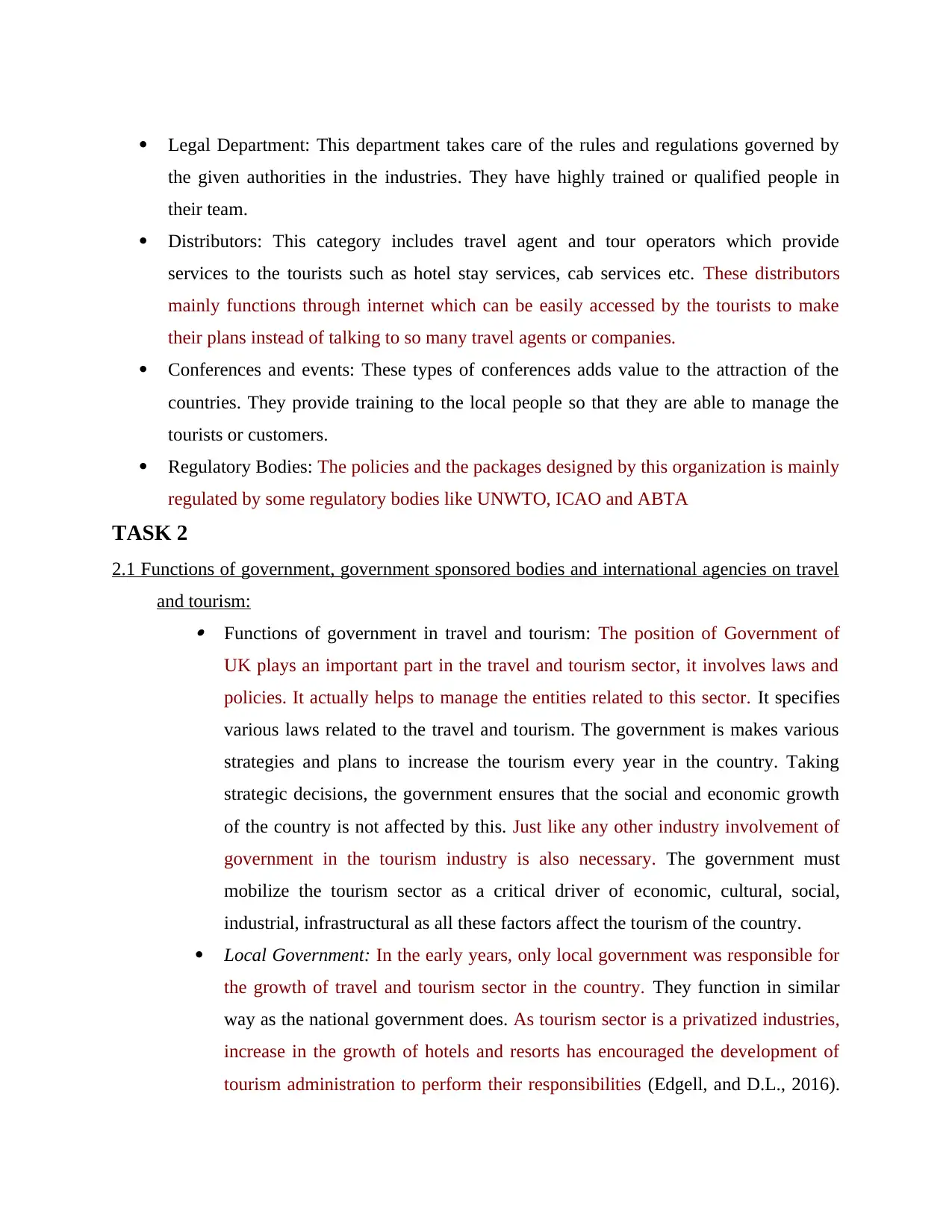
Legal Department: This department takes care of the rules and regulations governed by
the given authorities in the industries. They have highly trained or qualified people in
their team.
Distributors: This category includes travel agent and tour operators which provide
services to the tourists such as hotel stay services, cab services etc. These distributors
mainly functions through internet which can be easily accessed by the tourists to make
their plans instead of talking to so many travel agents or companies.
Conferences and events: These types of conferences adds value to the attraction of the
countries. They provide training to the local people so that they are able to manage the
tourists or customers.
Regulatory Bodies: The policies and the packages designed by this organization is mainly
regulated by some regulatory bodies like UNWTO, ICAO and ABTA
TASK 2
2.1 Functions of government, government sponsored bodies and international agencies on travel
and tourism:
Functions of government in travel and tourism: The position of Government of
UK plays an important part in the travel and tourism sector, it involves laws and
policies. It actually helps to manage the entities related to this sector. It specifies
various laws related to the travel and tourism. The government is makes various
strategies and plans to increase the tourism every year in the country. Taking
strategic decisions, the government ensures that the social and economic growth
of the country is not affected by this. Just like any other industry involvement of
government in the tourism industry is also necessary. The government must
mobilize the tourism sector as a critical driver of economic, cultural, social,
industrial, infrastructural as all these factors affect the tourism of the country.
Local Government: In the early years, only local government was responsible for
the growth of travel and tourism sector in the country. They function in similar
way as the national government does. As tourism sector is a privatized industries,
increase in the growth of hotels and resorts has encouraged the development of
tourism administration to perform their responsibilities (Edgell, and D.L., 2016).
the given authorities in the industries. They have highly trained or qualified people in
their team.
Distributors: This category includes travel agent and tour operators which provide
services to the tourists such as hotel stay services, cab services etc. These distributors
mainly functions through internet which can be easily accessed by the tourists to make
their plans instead of talking to so many travel agents or companies.
Conferences and events: These types of conferences adds value to the attraction of the
countries. They provide training to the local people so that they are able to manage the
tourists or customers.
Regulatory Bodies: The policies and the packages designed by this organization is mainly
regulated by some regulatory bodies like UNWTO, ICAO and ABTA
TASK 2
2.1 Functions of government, government sponsored bodies and international agencies on travel
and tourism:
Functions of government in travel and tourism: The position of Government of
UK plays an important part in the travel and tourism sector, it involves laws and
policies. It actually helps to manage the entities related to this sector. It specifies
various laws related to the travel and tourism. The government is makes various
strategies and plans to increase the tourism every year in the country. Taking
strategic decisions, the government ensures that the social and economic growth
of the country is not affected by this. Just like any other industry involvement of
government in the tourism industry is also necessary. The government must
mobilize the tourism sector as a critical driver of economic, cultural, social,
industrial, infrastructural as all these factors affect the tourism of the country.
Local Government: In the early years, only local government was responsible for
the growth of travel and tourism sector in the country. They function in similar
way as the national government does. As tourism sector is a privatized industries,
increase in the growth of hotels and resorts has encouraged the development of
tourism administration to perform their responsibilities (Edgell, and D.L., 2016).
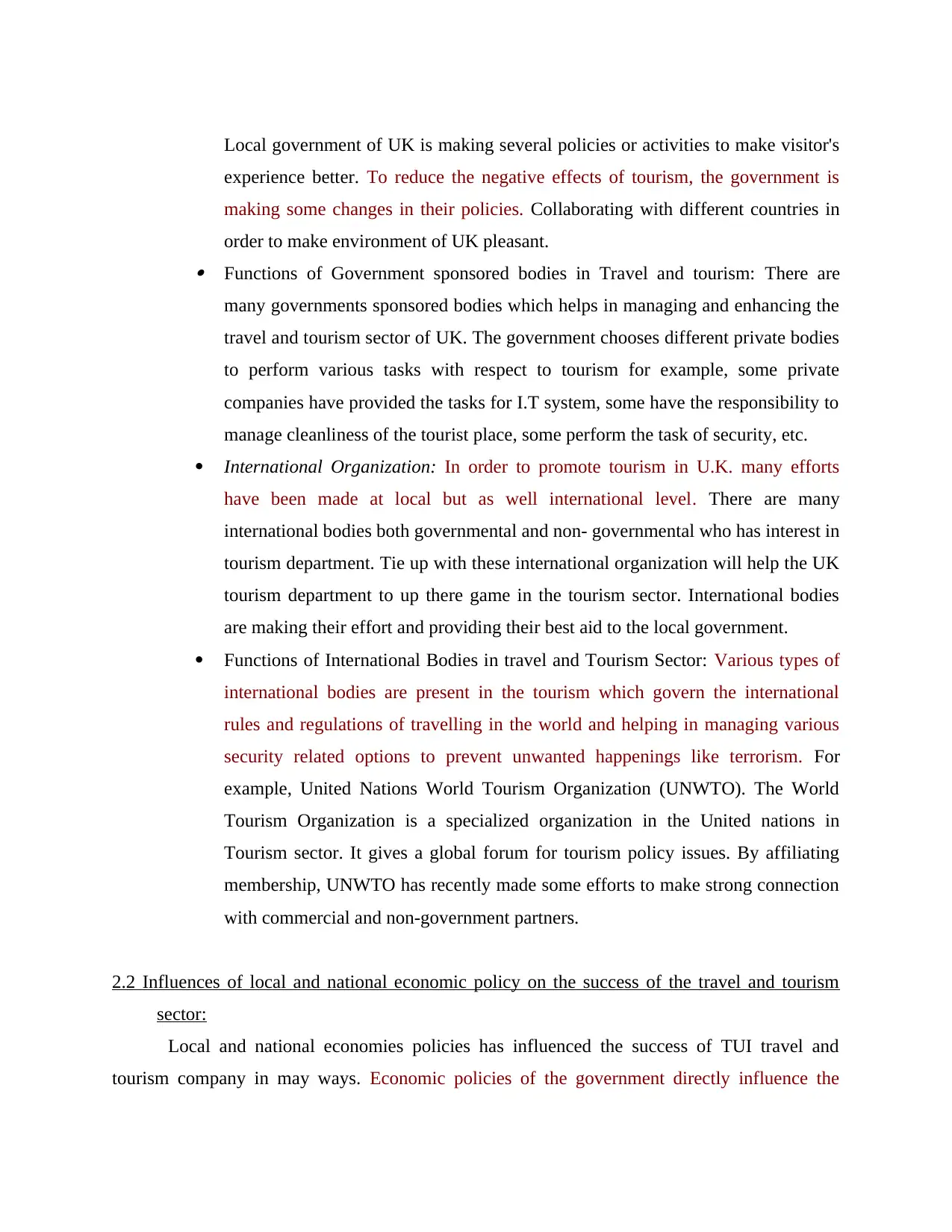
Local government of UK is making several policies or activities to make visitor's
experience better. To reduce the negative effects of tourism, the government is
making some changes in their policies. Collaborating with different countries in
order to make environment of UK pleasant.
Functions of Government sponsored bodies in Travel and tourism: There are
many governments sponsored bodies which helps in managing and enhancing the
travel and tourism sector of UK. The government chooses different private bodies
to perform various tasks with respect to tourism for example, some private
companies have provided the tasks for I.T system, some have the responsibility to
manage cleanliness of the tourist place, some perform the task of security, etc.
International Organization: In order to promote tourism in U.K. many efforts
have been made at local but as well international level. There are many
international bodies both governmental and non- governmental who has interest in
tourism department. Tie up with these international organization will help the UK
tourism department to up there game in the tourism sector. International bodies
are making their effort and providing their best aid to the local government.
Functions of International Bodies in travel and Tourism Sector: Various types of
international bodies are present in the tourism which govern the international
rules and regulations of travelling in the world and helping in managing various
security related options to prevent unwanted happenings like terrorism. For
example, United Nations World Tourism Organization (UNWTO). The World
Tourism Organization is a specialized organization in the United nations in
Tourism sector. It gives a global forum for tourism policy issues. By affiliating
membership, UNWTO has recently made some efforts to make strong connection
with commercial and non-government partners.
2.2 Influences of local and national economic policy on the success of the travel and tourism
sector:
Local and national economies policies has influenced the success of TUI travel and
tourism company in may ways. Economic policies of the government directly influence the
experience better. To reduce the negative effects of tourism, the government is
making some changes in their policies. Collaborating with different countries in
order to make environment of UK pleasant.
Functions of Government sponsored bodies in Travel and tourism: There are
many governments sponsored bodies which helps in managing and enhancing the
travel and tourism sector of UK. The government chooses different private bodies
to perform various tasks with respect to tourism for example, some private
companies have provided the tasks for I.T system, some have the responsibility to
manage cleanliness of the tourist place, some perform the task of security, etc.
International Organization: In order to promote tourism in U.K. many efforts
have been made at local but as well international level. There are many
international bodies both governmental and non- governmental who has interest in
tourism department. Tie up with these international organization will help the UK
tourism department to up there game in the tourism sector. International bodies
are making their effort and providing their best aid to the local government.
Functions of International Bodies in travel and Tourism Sector: Various types of
international bodies are present in the tourism which govern the international
rules and regulations of travelling in the world and helping in managing various
security related options to prevent unwanted happenings like terrorism. For
example, United Nations World Tourism Organization (UNWTO). The World
Tourism Organization is a specialized organization in the United nations in
Tourism sector. It gives a global forum for tourism policy issues. By affiliating
membership, UNWTO has recently made some efforts to make strong connection
with commercial and non-government partners.
2.2 Influences of local and national economic policy on the success of the travel and tourism
sector:
Local and national economies policies has influenced the success of TUI travel and
tourism company in may ways. Economic policies of the government directly influence the
⊘ This is a preview!⊘
Do you want full access?
Subscribe today to unlock all pages.

Trusted by 1+ million students worldwide
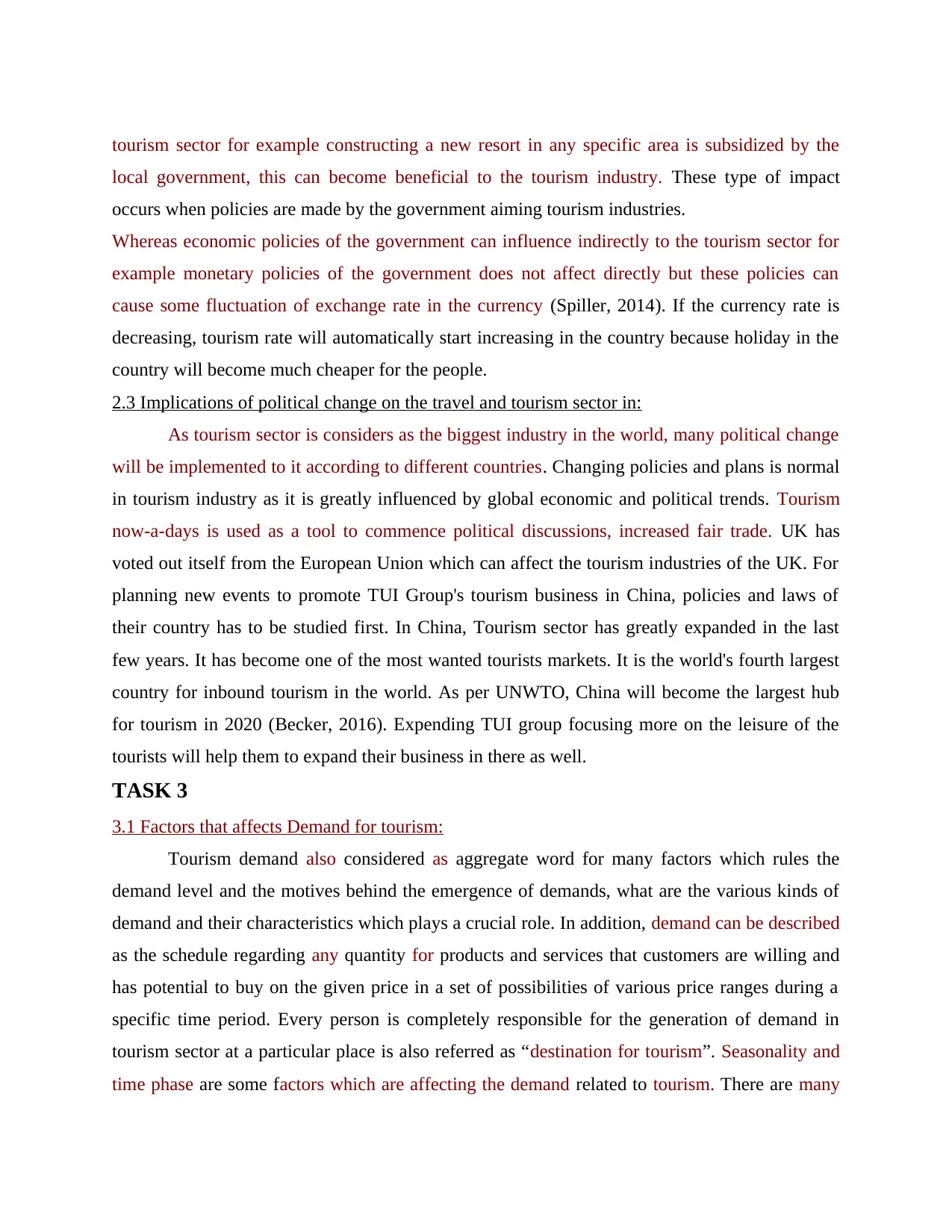
tourism sector for example constructing a new resort in any specific area is subsidized by the
local government, this can become beneficial to the tourism industry. These type of impact
occurs when policies are made by the government aiming tourism industries.
Whereas economic policies of the government can influence indirectly to the tourism sector for
example monetary policies of the government does not affect directly but these policies can
cause some fluctuation of exchange rate in the currency (Spiller, 2014). If the currency rate is
decreasing, tourism rate will automatically start increasing in the country because holiday in the
country will become much cheaper for the people.
2.3 Implications of political change on the travel and tourism sector in:
As tourism sector is considers as the biggest industry in the world, many political change
will be implemented to it according to different countries. Changing policies and plans is normal
in tourism industry as it is greatly influenced by global economic and political trends. Tourism
now-a-days is used as a tool to commence political discussions, increased fair trade. UK has
voted out itself from the European Union which can affect the tourism industries of the UK. For
planning new events to promote TUI Group's tourism business in China, policies and laws of
their country has to be studied first. In China, Tourism sector has greatly expanded in the last
few years. It has become one of the most wanted tourists markets. It is the world's fourth largest
country for inbound tourism in the world. As per UNWTO, China will become the largest hub
for tourism in 2020 (Becker, 2016). Expending TUI group focusing more on the leisure of the
tourists will help them to expand their business in there as well.
TASK 3
3.1 Factors that affects Demand for tourism:
Tourism demand also considered as aggregate word for many factors which rules the
demand level and the motives behind the emergence of demands, what are the various kinds of
demand and their characteristics which plays a crucial role. In addition, demand can be described
as the schedule regarding any quantity for products and services that customers are willing and
has potential to buy on the given price in a set of possibilities of various price ranges during a
specific time period. Every person is completely responsible for the generation of demand in
tourism sector at a particular place is also referred as “destination for tourism”. Seasonality and
time phase are some factors which are affecting the demand related to tourism. There are many
local government, this can become beneficial to the tourism industry. These type of impact
occurs when policies are made by the government aiming tourism industries.
Whereas economic policies of the government can influence indirectly to the tourism sector for
example monetary policies of the government does not affect directly but these policies can
cause some fluctuation of exchange rate in the currency (Spiller, 2014). If the currency rate is
decreasing, tourism rate will automatically start increasing in the country because holiday in the
country will become much cheaper for the people.
2.3 Implications of political change on the travel and tourism sector in:
As tourism sector is considers as the biggest industry in the world, many political change
will be implemented to it according to different countries. Changing policies and plans is normal
in tourism industry as it is greatly influenced by global economic and political trends. Tourism
now-a-days is used as a tool to commence political discussions, increased fair trade. UK has
voted out itself from the European Union which can affect the tourism industries of the UK. For
planning new events to promote TUI Group's tourism business in China, policies and laws of
their country has to be studied first. In China, Tourism sector has greatly expanded in the last
few years. It has become one of the most wanted tourists markets. It is the world's fourth largest
country for inbound tourism in the world. As per UNWTO, China will become the largest hub
for tourism in 2020 (Becker, 2016). Expending TUI group focusing more on the leisure of the
tourists will help them to expand their business in there as well.
TASK 3
3.1 Factors that affects Demand for tourism:
Tourism demand also considered as aggregate word for many factors which rules the
demand level and the motives behind the emergence of demands, what are the various kinds of
demand and their characteristics which plays a crucial role. In addition, demand can be described
as the schedule regarding any quantity for products and services that customers are willing and
has potential to buy on the given price in a set of possibilities of various price ranges during a
specific time period. Every person is completely responsible for the generation of demand in
tourism sector at a particular place is also referred as “destination for tourism”. Seasonality and
time phase are some factors which are affecting the demand related to tourism. There are many
Paraphrase This Document
Need a fresh take? Get an instant paraphrase of this document with our AI Paraphraser
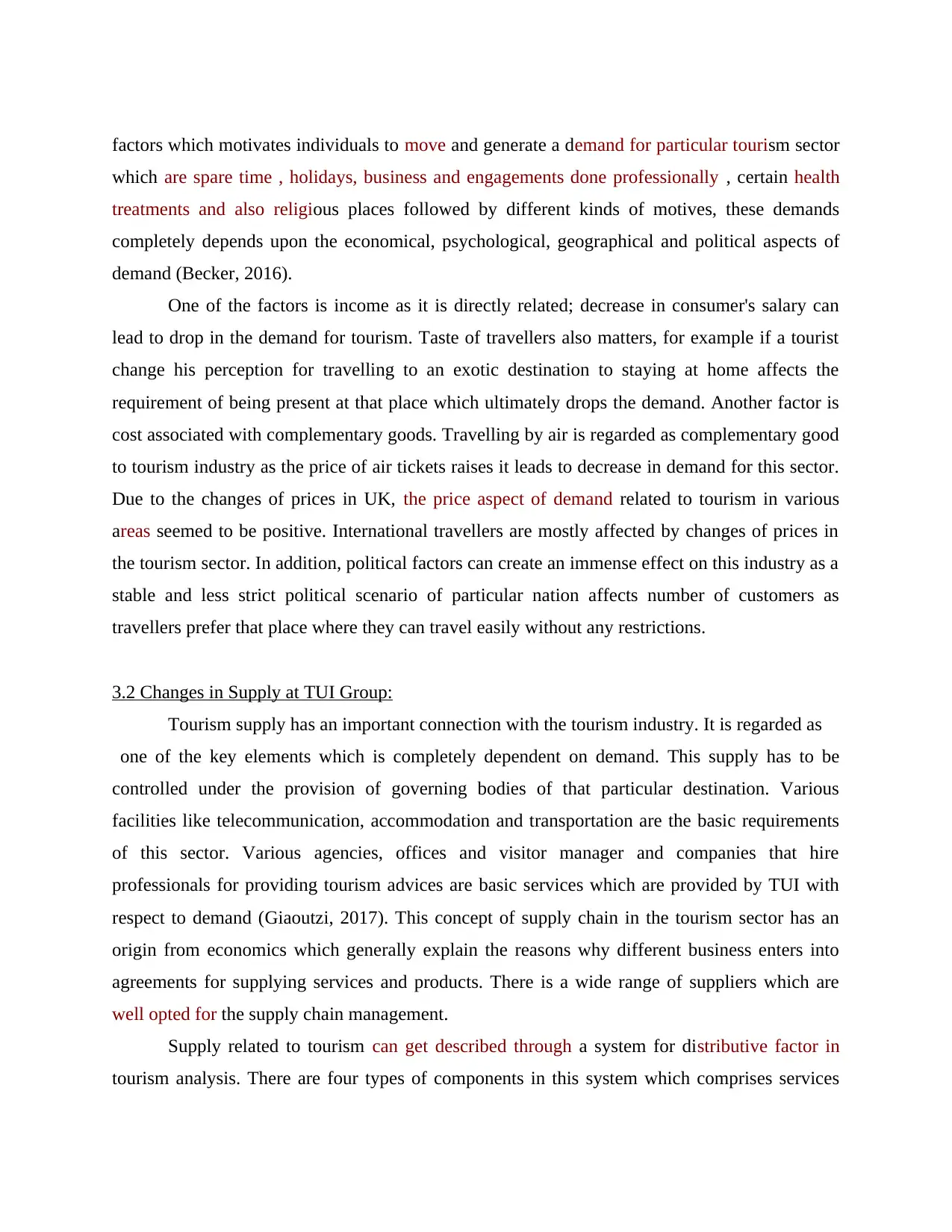
factors which motivates individuals to move and generate a demand for particular tourism sector
which are spare time , holidays, business and engagements done professionally , certain health
treatments and also religious places followed by different kinds of motives, these demands
completely depends upon the economical, psychological, geographical and political aspects of
demand (Becker, 2016).
One of the factors is income as it is directly related; decrease in consumer's salary can
lead to drop in the demand for tourism. Taste of travellers also matters, for example if a tourist
change his perception for travelling to an exotic destination to staying at home affects the
requirement of being present at that place which ultimately drops the demand. Another factor is
cost associated with complementary goods. Travelling by air is regarded as complementary good
to tourism industry as the price of air tickets raises it leads to decrease in demand for this sector.
Due to the changes of prices in UK, the price aspect of demand related to tourism in various
areas seemed to be positive. International travellers are mostly affected by changes of prices in
the tourism sector. In addition, political factors can create an immense effect on this industry as a
stable and less strict political scenario of particular nation affects number of customers as
travellers prefer that place where they can travel easily without any restrictions.
3.2 Changes in Supply at TUI Group:
Tourism supply has an important connection with the tourism industry. It is regarded as
one of the key elements which is completely dependent on demand. This supply has to be
controlled under the provision of governing bodies of that particular destination. Various
facilities like telecommunication, accommodation and transportation are the basic requirements
of this sector. Various agencies, offices and visitor manager and companies that hire
professionals for providing tourism advices are basic services which are provided by TUI with
respect to demand (Giaoutzi, 2017). This concept of supply chain in the tourism sector has an
origin from economics which generally explain the reasons why different business enters into
agreements for supplying services and products. There is a wide range of suppliers which are
well opted for the supply chain management.
Supply related to tourism can get described through a system for distributive factor in
tourism analysis. There are four types of components in this system which comprises services
which are spare time , holidays, business and engagements done professionally , certain health
treatments and also religious places followed by different kinds of motives, these demands
completely depends upon the economical, psychological, geographical and political aspects of
demand (Becker, 2016).
One of the factors is income as it is directly related; decrease in consumer's salary can
lead to drop in the demand for tourism. Taste of travellers also matters, for example if a tourist
change his perception for travelling to an exotic destination to staying at home affects the
requirement of being present at that place which ultimately drops the demand. Another factor is
cost associated with complementary goods. Travelling by air is regarded as complementary good
to tourism industry as the price of air tickets raises it leads to decrease in demand for this sector.
Due to the changes of prices in UK, the price aspect of demand related to tourism in various
areas seemed to be positive. International travellers are mostly affected by changes of prices in
the tourism sector. In addition, political factors can create an immense effect on this industry as a
stable and less strict political scenario of particular nation affects number of customers as
travellers prefer that place where they can travel easily without any restrictions.
3.2 Changes in Supply at TUI Group:
Tourism supply has an important connection with the tourism industry. It is regarded as
one of the key elements which is completely dependent on demand. This supply has to be
controlled under the provision of governing bodies of that particular destination. Various
facilities like telecommunication, accommodation and transportation are the basic requirements
of this sector. Various agencies, offices and visitor manager and companies that hire
professionals for providing tourism advices are basic services which are provided by TUI with
respect to demand (Giaoutzi, 2017). This concept of supply chain in the tourism sector has an
origin from economics which generally explain the reasons why different business enters into
agreements for supplying services and products. There is a wide range of suppliers which are
well opted for the supply chain management.
Supply related to tourism can get described through a system for distributive factor in
tourism analysis. There are four types of components in this system which comprises services
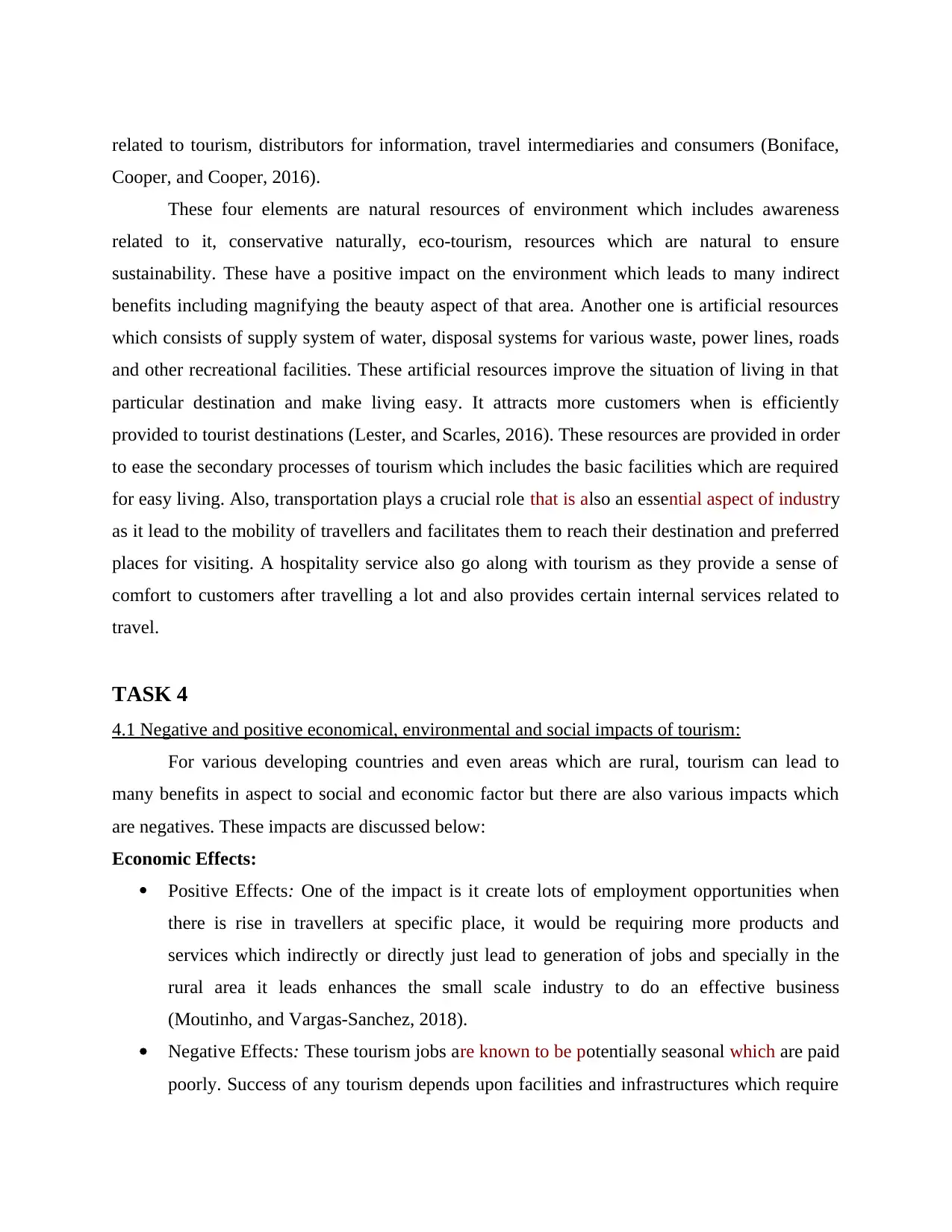
related to tourism, distributors for information, travel intermediaries and consumers (Boniface,
Cooper, and Cooper, 2016).
These four elements are natural resources of environment which includes awareness
related to it, conservative naturally, eco-tourism, resources which are natural to ensure
sustainability. These have a positive impact on the environment which leads to many indirect
benefits including magnifying the beauty aspect of that area. Another one is artificial resources
which consists of supply system of water, disposal systems for various waste, power lines, roads
and other recreational facilities. These artificial resources improve the situation of living in that
particular destination and make living easy. It attracts more customers when is efficiently
provided to tourist destinations (Lester, and Scarles, 2016). These resources are provided in order
to ease the secondary processes of tourism which includes the basic facilities which are required
for easy living. Also, transportation plays a crucial role that is also an essential aspect of industry
as it lead to the mobility of travellers and facilitates them to reach their destination and preferred
places for visiting. A hospitality service also go along with tourism as they provide a sense of
comfort to customers after travelling a lot and also provides certain internal services related to
travel.
TASK 4
4.1 Negative and positive economical, environmental and social impacts of tourism:
For various developing countries and even areas which are rural, tourism can lead to
many benefits in aspect to social and economic factor but there are also various impacts which
are negatives. These impacts are discussed below:
Economic Effects:
Positive Effects: One of the impact is it create lots of employment opportunities when
there is rise in travellers at specific place, it would be requiring more products and
services which indirectly or directly just lead to generation of jobs and specially in the
rural area it leads enhances the small scale industry to do an effective business
(Moutinho, and Vargas-Sanchez, 2018).
Negative Effects: These tourism jobs are known to be potentially seasonal which are paid
poorly. Success of any tourism depends upon facilities and infrastructures which require
Cooper, and Cooper, 2016).
These four elements are natural resources of environment which includes awareness
related to it, conservative naturally, eco-tourism, resources which are natural to ensure
sustainability. These have a positive impact on the environment which leads to many indirect
benefits including magnifying the beauty aspect of that area. Another one is artificial resources
which consists of supply system of water, disposal systems for various waste, power lines, roads
and other recreational facilities. These artificial resources improve the situation of living in that
particular destination and make living easy. It attracts more customers when is efficiently
provided to tourist destinations (Lester, and Scarles, 2016). These resources are provided in order
to ease the secondary processes of tourism which includes the basic facilities which are required
for easy living. Also, transportation plays a crucial role that is also an essential aspect of industry
as it lead to the mobility of travellers and facilitates them to reach their destination and preferred
places for visiting. A hospitality service also go along with tourism as they provide a sense of
comfort to customers after travelling a lot and also provides certain internal services related to
travel.
TASK 4
4.1 Negative and positive economical, environmental and social impacts of tourism:
For various developing countries and even areas which are rural, tourism can lead to
many benefits in aspect to social and economic factor but there are also various impacts which
are negatives. These impacts are discussed below:
Economic Effects:
Positive Effects: One of the impact is it create lots of employment opportunities when
there is rise in travellers at specific place, it would be requiring more products and
services which indirectly or directly just lead to generation of jobs and specially in the
rural area it leads enhances the small scale industry to do an effective business
(Moutinho, and Vargas-Sanchez, 2018).
Negative Effects: These tourism jobs are known to be potentially seasonal which are paid
poorly. Success of any tourism depends upon facilities and infrastructures which require
⊘ This is a preview!⊘
Do you want full access?
Subscribe today to unlock all pages.

Trusted by 1+ million students worldwide
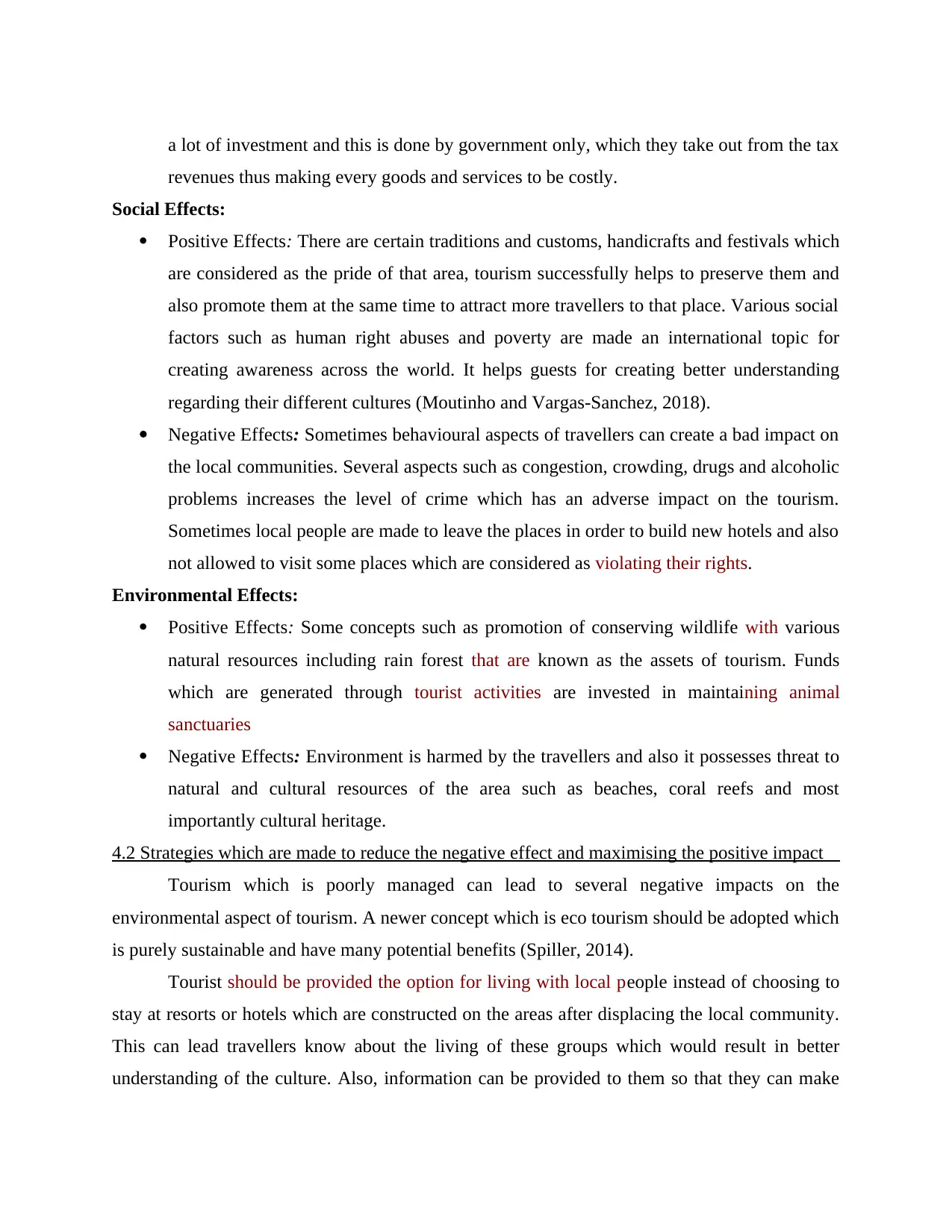
a lot of investment and this is done by government only, which they take out from the tax
revenues thus making every goods and services to be costly.
Social Effects:
Positive Effects: There are certain traditions and customs, handicrafts and festivals which
are considered as the pride of that area, tourism successfully helps to preserve them and
also promote them at the same time to attract more travellers to that place. Various social
factors such as human right abuses and poverty are made an international topic for
creating awareness across the world. It helps guests for creating better understanding
regarding their different cultures (Moutinho and Vargas-Sanchez, 2018).
Negative Effects: Sometimes behavioural aspects of travellers can create a bad impact on
the local communities. Several aspects such as congestion, crowding, drugs and alcoholic
problems increases the level of crime which has an adverse impact on the tourism.
Sometimes local people are made to leave the places in order to build new hotels and also
not allowed to visit some places which are considered as violating their rights.
Environmental Effects:
Positive Effects: Some concepts such as promotion of conserving wildlife with various
natural resources including rain forest that are known as the assets of tourism. Funds
which are generated through tourist activities are invested in maintaining animal
sanctuaries
Negative Effects: Environment is harmed by the travellers and also it possesses threat to
natural and cultural resources of the area such as beaches, coral reefs and most
importantly cultural heritage.
4.2 Strategies which are made to reduce the negative effect and maximising the positive impact
Tourism which is poorly managed can lead to several negative impacts on the
environmental aspect of tourism. A newer concept which is eco tourism should be adopted which
is purely sustainable and have many potential benefits (Spiller, 2014).
Tourist should be provided the option for living with local people instead of choosing to
stay at resorts or hotels which are constructed on the areas after displacing the local community.
This can lead travellers know about the living of these groups which would result in better
understanding of the culture. Also, information can be provided to them so that they can make
revenues thus making every goods and services to be costly.
Social Effects:
Positive Effects: There are certain traditions and customs, handicrafts and festivals which
are considered as the pride of that area, tourism successfully helps to preserve them and
also promote them at the same time to attract more travellers to that place. Various social
factors such as human right abuses and poverty are made an international topic for
creating awareness across the world. It helps guests for creating better understanding
regarding their different cultures (Moutinho and Vargas-Sanchez, 2018).
Negative Effects: Sometimes behavioural aspects of travellers can create a bad impact on
the local communities. Several aspects such as congestion, crowding, drugs and alcoholic
problems increases the level of crime which has an adverse impact on the tourism.
Sometimes local people are made to leave the places in order to build new hotels and also
not allowed to visit some places which are considered as violating their rights.
Environmental Effects:
Positive Effects: Some concepts such as promotion of conserving wildlife with various
natural resources including rain forest that are known as the assets of tourism. Funds
which are generated through tourist activities are invested in maintaining animal
sanctuaries
Negative Effects: Environment is harmed by the travellers and also it possesses threat to
natural and cultural resources of the area such as beaches, coral reefs and most
importantly cultural heritage.
4.2 Strategies which are made to reduce the negative effect and maximising the positive impact
Tourism which is poorly managed can lead to several negative impacts on the
environmental aspect of tourism. A newer concept which is eco tourism should be adopted which
is purely sustainable and have many potential benefits (Spiller, 2014).
Tourist should be provided the option for living with local people instead of choosing to
stay at resorts or hotels which are constructed on the areas after displacing the local community.
This can lead travellers know about the living of these groups which would result in better
understanding of the culture. Also, information can be provided to them so that they can make
Paraphrase This Document
Need a fresh take? Get an instant paraphrase of this document with our AI Paraphraser
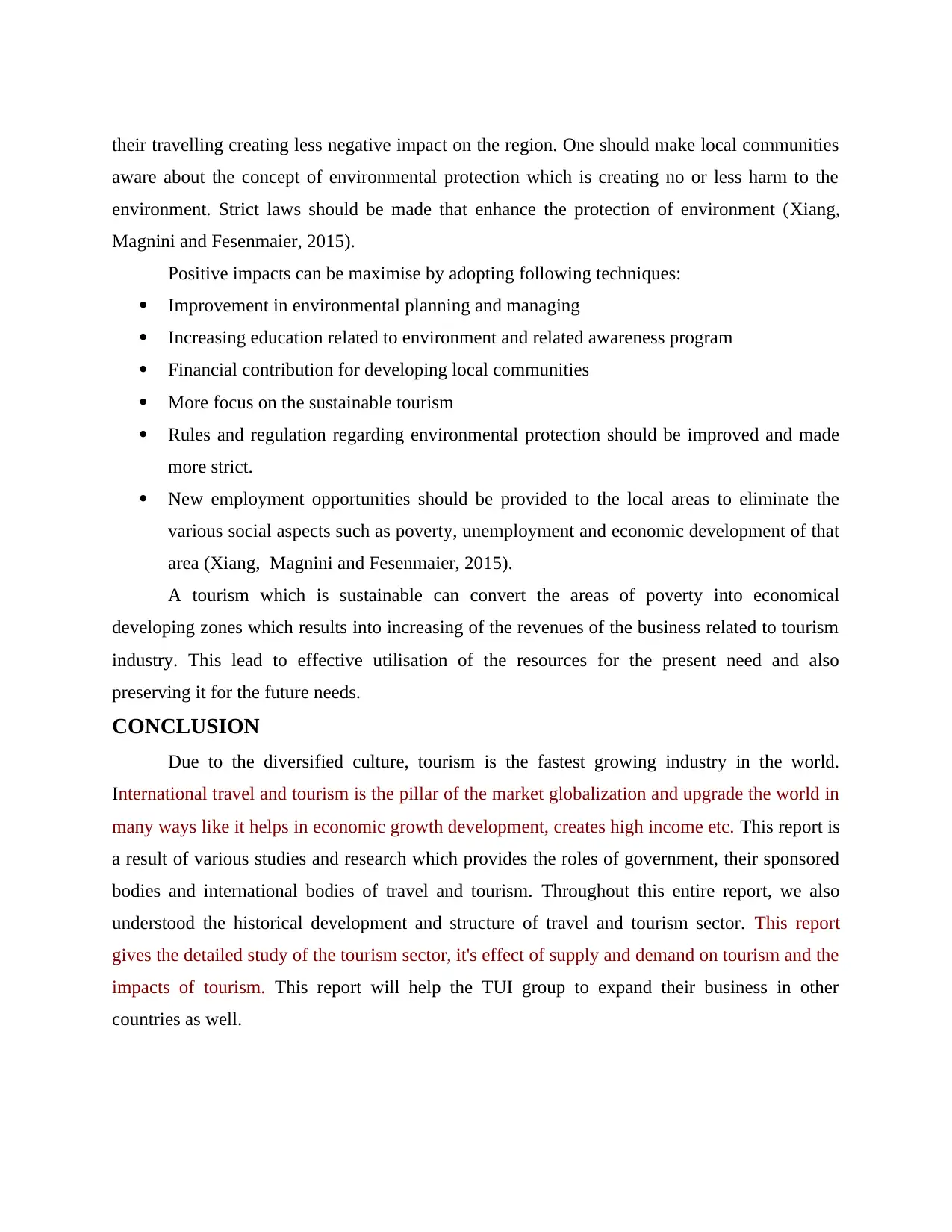
their travelling creating less negative impact on the region. One should make local communities
aware about the concept of environmental protection which is creating no or less harm to the
environment. Strict laws should be made that enhance the protection of environment (Xiang,
Magnini and Fesenmaier, 2015).
Positive impacts can be maximise by adopting following techniques:
Improvement in environmental planning and managing
Increasing education related to environment and related awareness program
Financial contribution for developing local communities
More focus on the sustainable tourism
Rules and regulation regarding environmental protection should be improved and made
more strict.
New employment opportunities should be provided to the local areas to eliminate the
various social aspects such as poverty, unemployment and economic development of that
area (Xiang, Magnini and Fesenmaier, 2015).
A tourism which is sustainable can convert the areas of poverty into economical
developing zones which results into increasing of the revenues of the business related to tourism
industry. This lead to effective utilisation of the resources for the present need and also
preserving it for the future needs.
CONCLUSION
Due to the diversified culture, tourism is the fastest growing industry in the world.
International travel and tourism is the pillar of the market globalization and upgrade the world in
many ways like it helps in economic growth development, creates high income etc. This report is
a result of various studies and research which provides the roles of government, their sponsored
bodies and international bodies of travel and tourism. Throughout this entire report, we also
understood the historical development and structure of travel and tourism sector. This report
gives the detailed study of the tourism sector, it's effect of supply and demand on tourism and the
impacts of tourism. This report will help the TUI group to expand their business in other
countries as well.
aware about the concept of environmental protection which is creating no or less harm to the
environment. Strict laws should be made that enhance the protection of environment (Xiang,
Magnini and Fesenmaier, 2015).
Positive impacts can be maximise by adopting following techniques:
Improvement in environmental planning and managing
Increasing education related to environment and related awareness program
Financial contribution for developing local communities
More focus on the sustainable tourism
Rules and regulation regarding environmental protection should be improved and made
more strict.
New employment opportunities should be provided to the local areas to eliminate the
various social aspects such as poverty, unemployment and economic development of that
area (Xiang, Magnini and Fesenmaier, 2015).
A tourism which is sustainable can convert the areas of poverty into economical
developing zones which results into increasing of the revenues of the business related to tourism
industry. This lead to effective utilisation of the resources for the present need and also
preserving it for the future needs.
CONCLUSION
Due to the diversified culture, tourism is the fastest growing industry in the world.
International travel and tourism is the pillar of the market globalization and upgrade the world in
many ways like it helps in economic growth development, creates high income etc. This report is
a result of various studies and research which provides the roles of government, their sponsored
bodies and international bodies of travel and tourism. Throughout this entire report, we also
understood the historical development and structure of travel and tourism sector. This report
gives the detailed study of the tourism sector, it's effect of supply and demand on tourism and the
impacts of tourism. This report will help the TUI group to expand their business in other
countries as well.
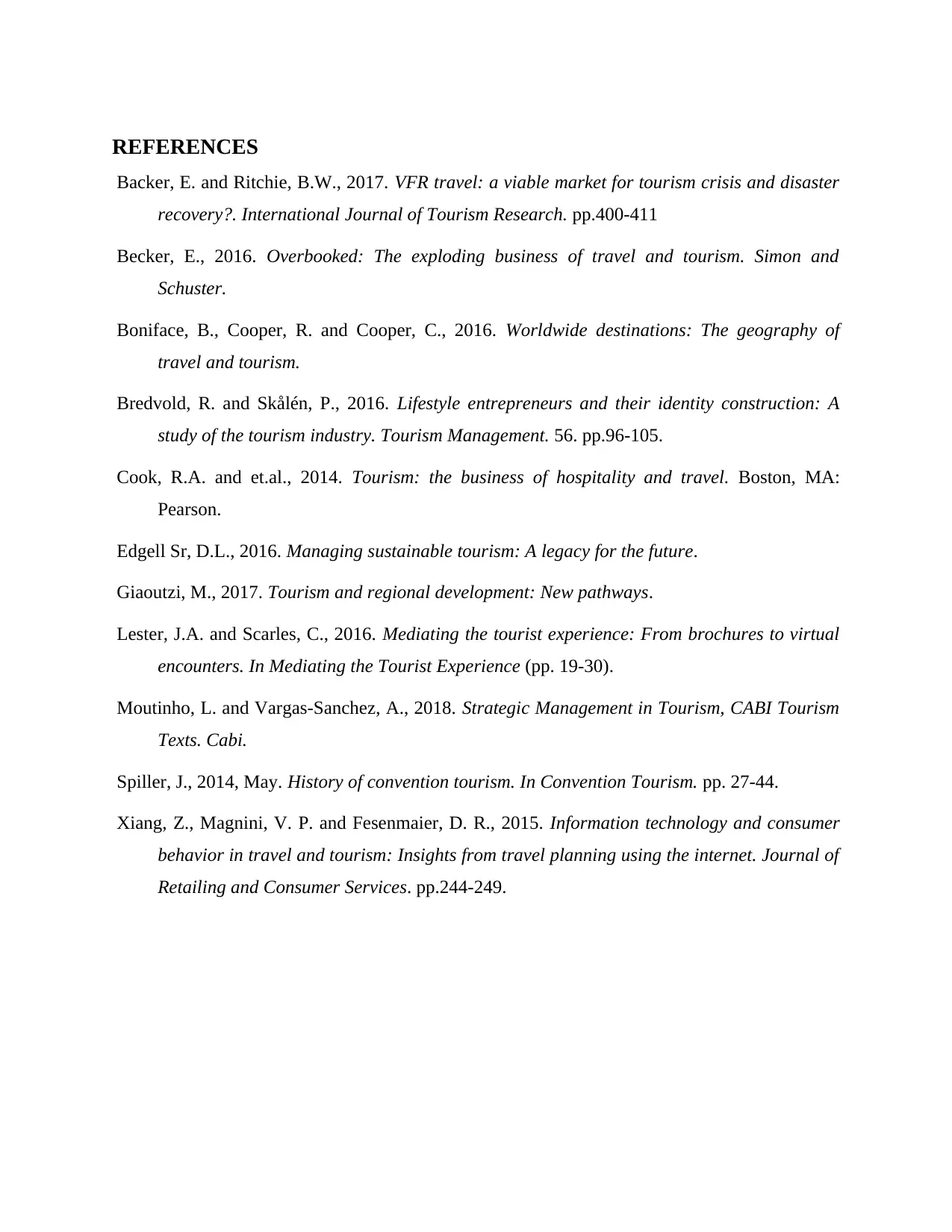
REFERENCES
Backer, E. and Ritchie, B.W., 2017. VFR travel: a viable market for tourism crisis and disaster
recovery?. International Journal of Tourism Research. pp.400-411
Becker, E., 2016. Overbooked: The exploding business of travel and tourism. Simon and
Schuster.
Boniface, B., Cooper, R. and Cooper, C., 2016. Worldwide destinations: The geography of
travel and tourism.
Bredvold, R. and Skålén, P., 2016. Lifestyle entrepreneurs and their identity construction: A
study of the tourism industry. Tourism Management. 56. pp.96-105.
Cook, R.A. and et.al., 2014. Tourism: the business of hospitality and travel. Boston, MA:
Pearson.
Edgell Sr, D.L., 2016. Managing sustainable tourism: A legacy for the future.
Giaoutzi, M., 2017. Tourism and regional development: New pathways.
Lester, J.A. and Scarles, C., 2016. Mediating the tourist experience: From brochures to virtual
encounters. In Mediating the Tourist Experience (pp. 19-30).
Moutinho, L. and Vargas-Sanchez, A., 2018. Strategic Management in Tourism, CABI Tourism
Texts. Cabi.
Spiller, J., 2014, May. History of convention tourism. In Convention Tourism. pp. 27-44.
Xiang, Z., Magnini, V. P. and Fesenmaier, D. R., 2015. Information technology and consumer
behavior in travel and tourism: Insights from travel planning using the internet. Journal of
Retailing and Consumer Services. pp.244-249.
Backer, E. and Ritchie, B.W., 2017. VFR travel: a viable market for tourism crisis and disaster
recovery?. International Journal of Tourism Research. pp.400-411
Becker, E., 2016. Overbooked: The exploding business of travel and tourism. Simon and
Schuster.
Boniface, B., Cooper, R. and Cooper, C., 2016. Worldwide destinations: The geography of
travel and tourism.
Bredvold, R. and Skålén, P., 2016. Lifestyle entrepreneurs and their identity construction: A
study of the tourism industry. Tourism Management. 56. pp.96-105.
Cook, R.A. and et.al., 2014. Tourism: the business of hospitality and travel. Boston, MA:
Pearson.
Edgell Sr, D.L., 2016. Managing sustainable tourism: A legacy for the future.
Giaoutzi, M., 2017. Tourism and regional development: New pathways.
Lester, J.A. and Scarles, C., 2016. Mediating the tourist experience: From brochures to virtual
encounters. In Mediating the Tourist Experience (pp. 19-30).
Moutinho, L. and Vargas-Sanchez, A., 2018. Strategic Management in Tourism, CABI Tourism
Texts. Cabi.
Spiller, J., 2014, May. History of convention tourism. In Convention Tourism. pp. 27-44.
Xiang, Z., Magnini, V. P. and Fesenmaier, D. R., 2015. Information technology and consumer
behavior in travel and tourism: Insights from travel planning using the internet. Journal of
Retailing and Consumer Services. pp.244-249.
⊘ This is a preview!⊘
Do you want full access?
Subscribe today to unlock all pages.

Trusted by 1+ million students worldwide
1 out of 12
Related Documents
Your All-in-One AI-Powered Toolkit for Academic Success.
+13062052269
info@desklib.com
Available 24*7 on WhatsApp / Email
![[object Object]](/_next/static/media/star-bottom.7253800d.svg)
Unlock your academic potential
Copyright © 2020–2026 A2Z Services. All Rights Reserved. Developed and managed by ZUCOL.





